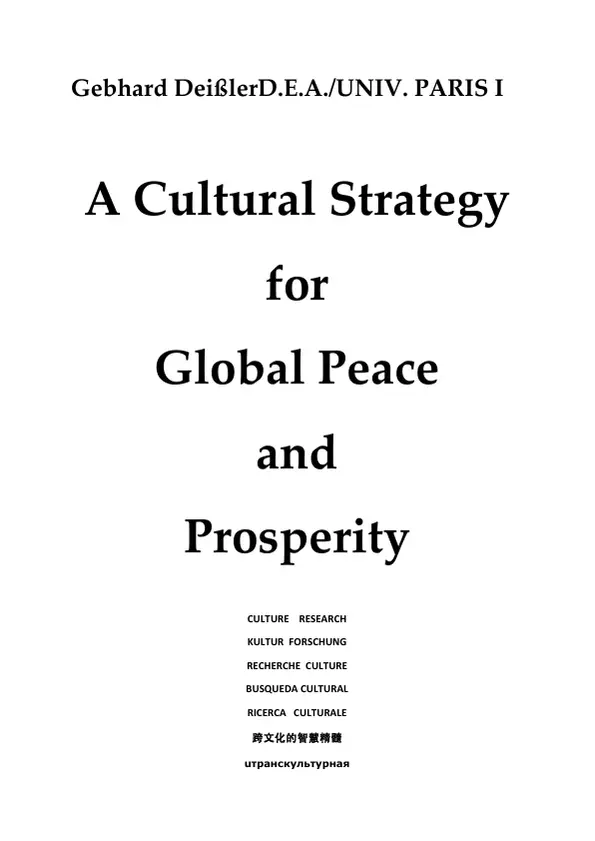“Si vis pacem para bellum.”
versus
“Si vis pacem para pacem.”
For times immemorial man has sought to achieve a state of freedom from outer conflict guided by the pole of the above continuum designated by the Ancient Romans as “Si vis pacem para bellum”, translating as “If you want peace, prepare for war”. Those who deviated strongly from this implicit assumption by positioning themselves differently on the continuum and thereby reversed this logic were disappointing the mainstream cultures of their eras and were considered out-group personae non gratae by the dominant cultural players. This study shows how the dilemma could be resolved.
Table of Contents
- I The dilemma "Si vis pacem para bellum" versus "Si vis pacem para pacem."
- II. Review and upgrade of the intercultural paradigm
- 1. The State-of-the-Art of the Intercultural Art and Science: On Human RelativityIn Intercultural Research
- 2. Enhancing the Intercultural Art and Science: Sources, Models and the Achievement of True Cultural Intelligence
- III Some applications of the enhanced cultural paradigm
- 1. The dawn of an intercultural metascience. An epistemological blueprint for 360° synergy
- 2. Global culture systems analysis. Sustainability and Accountability
- 3. Transnational management
- 4. Global negotiatons management
- 5. The conquest of transcultural intelligence
- IV Intercultural and transcultural management instruments
- V Intercultural and transcultural special terms and concepts
Objectives and Key Themes
This work aims to propose a new, comprehensive intercultural strategy for achieving global peace and prosperity, replacing the traditional “prepare for war” paradigm with a “prepare for peace” approach. The text challenges traditional assumptions and develops a framework for true cultural intelligence, emphasizing the need for understanding and cooperation across cultures. Key themes explored in the work include:- The limitations of the traditional "prepare for war" paradigm
- The need for a new intercultural paradigm based on peace and cooperation
- The development of cultural intelligence and its application in various fields
- The role of transcultural management and communication in fostering global peace and prosperity
- The importance of intercultural metascience and its application in various fields.
Chapter Summaries
- Chapter I: This chapter introduces the central dilemma of the work: the traditional "Si vis pacem para bellum" ("If you want peace, prepare for war") approach versus the "Si vis pacem para pacem" ("If you want peace, prepare for peace") approach. It argues that the former has been the dominant paradigm for centuries, leading to conflict and violence, while the latter offers a more sustainable and peaceful path to global harmony.
- Chapter II: This chapter analyzes the current state of the intercultural art and science, highlighting its limitations and proposing an enhanced paradigm. It focuses on the development of cultural intelligence, drawing on various sources and models to create a framework for true understanding and collaboration across cultures.
- Chapter III: This chapter examines various applications of the enhanced intercultural paradigm, including the development of an intercultural metascience, global culture systems analysis, transnational management, global negotiations management, and the conquest of transcultural intelligence.
- Chapter IV: This chapter explores various instruments for intercultural and transcultural management, offering practical tools for effective cross-cultural communication and collaboration.
Keywords
This work focuses on key concepts such as intercultural and transcultural management, cultural intelligence, global peace and prosperity, the "prepare for peace" paradigm, intercultural metascience, and global culture systems analysis. It explores the importance of understanding and collaborating across cultures, promoting a more harmonious and sustainable future.
Ende der Leseprobe aus 216 Seiten
- nach oben
- Arbeit zitieren
- D.E.A./UNIV. PARIS I Gebhard Deissler (Autor:in), 2012, A Cultural Strategy for Global Peace and Prosperity, München, GRIN Verlag, https://www.grin.com/document/189524
Blick ins Buch



